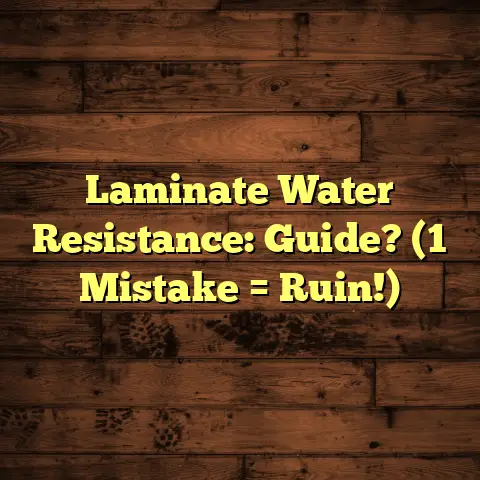Commercial Vinyl Flooring Cost (Explained)
Vinyl flooring has gained immense popularity in commercial spaces due to its durability, versatility, and cost-effectiveness. When considering this type of flooring for your project, it’s essential to understand the various factors that influence its overall cost. This comprehensive guide will break down the major cost considerations, provide detailed cost estimates, compare vinyl with other flooring options, and offer insights into maintenance and installation.
Major Cost Factors Influencing Vinyl Flooring Installation
1. Area Size
The size of the area to be floored significantly impacts the total cost. Larger spaces can benefit from bulk pricing on materials but may incur higher labor costs due to increased installation time.
2. Vinyl Type
There are several types of vinyl flooring, including:
- Luxury Vinyl Tile (LVT): Higher quality, realistic appearance, often used in upscale commercial spaces.
- Vinyl Sheet: Generally more affordable, suitable for larger areas.
- Vinyl Plank: Mimics hardwood appearance and is popular in various commercial settings.
3. Labor Costs
Labor costs vary based on the complexity of the installation and geographic location. Skilled labor is essential for ensuring a proper installation that maximises the longevity of the flooring.
4. Additional Considerations
- Floor Removal: If an existing floor needs to be removed, this can add to the overall cost.
- Subfloor Replacement: Repairing or replacing an existing subfloor may be necessary to ensure a level surface.
- Material Grade: Higher-grade materials typically come with a higher price tag but offer better durability and aesthetics.
- Room Size/Layout: Unusual room shapes may require more intricate cutting and fitting, increasing labor time and costs.
Detailed Cost Breakdown
Cost Estimates for Different Project Sizes
| Project Size | Cost Range (Materials + Labor) |
|---|---|
| Small (100-200 sq ft) | $800 – $2,000 |
| Medium (500-1,000 sq ft) | $2,500 – $5,000 |
| Large (1,500-3,000 sq ft) | $5,000 – $12,000 |
Vinyl Flooring Types & Price Ranges
| Vinyl Type | Average Cost per Square Foot (Materials Only) |
|---|---|
| Luxury Vinyl Tile | $2.50 – $5.00 |
| Vinyl Sheet | $0.80 – $2.00 |
| Vinyl Plank | $1.50 – $4.00 |
Comparison: Vinyl vs. Alternative Flooring Options
1. Laminate
- Cost: Typically ranges from $1.00 to $3.00 per sq ft.
- Pros: Affordable and easy to install; mimics wood appearance.
- Cons: Less durable than vinyl; susceptible to moisture damage.
2. Carpet
- Cost: Ranges from $1.00 to $5.00 per sq ft.
- Pros: Comfortable and warm; available in a variety of styles.
- Cons: Stains easily; requires more frequent cleaning.
3. Hardwood
- Cost: Between $5.00 and $10.00 per sq ft for materials alone.
- Pros: Timeless appeal; can be refinished multiple times.
- Cons: More expensive; requires more maintenance.
Signs That Vinyl Floors Need Replacement
- Severe Scratches or Gouges: If the damage is extensive, replacement may be more cost-effective than repair.
- Warping or Buckling: Indications of moisture damage usually require replacement.
- Fading or Discoloration: Significant wear can affect aesthetics and may necessitate a new floor.
Refurbishing vs. Replacing
When considering whether to refinish or replace your vinyl flooring, evaluate:
- Extent of Damage: Minor scratches can often be repaired; larger issues may warrant replacement.
- Age of the Floor: Older floors may not be worth investing in repairs.
Pros and Cons of Vinyl Flooring
Pros
- Durability: Resistant to scratches and dents.
- Water Resistance: Ideal for high-moisture areas like kitchens and bathrooms.
- Variety: Available in numerous styles, colours, and patterns.
Cons
- Heat Sensitivity: Can warp if exposed to excessive heat.
- Environmental Impact: Made from plastic materials which may not be fully eco-friendly.
Professional Installation vs. DIY
Cost Differences
- Professional Installation: Typically ranges from $1.50 to $3.50 per sq ft for labor.
- DIY Installation: While it can save on labor costs, consider the price of tools and potential mistakes.
Tools & Skills Required
For DIY enthusiasts, essential tools include:
- Utility knife
- Straight edge
- Measuring tape
- Roller or kneepad
Proper skills in measuring and cutting are crucial for achieving professional-looking results.
Questions to Ask Hardwood Flooring Contractors
- What is your experience with vinyl flooring installations?
- Can you provide references from previous clients?
- What warranties do you offer on materials and installation?
- How do you handle unexpected issues during installation?
- What preparation do you recommend before installation?
Hardwood Floor Care and Maintenance Tips
To maximise the longevity of your vinyl flooring:
- Clean regularly with a damp mop and a mild cleaner.
- Avoid harsh chemicals that can damage the surface.
- Use felt pads under furniture to prevent scratches.
- Address spills immediately to prevent moisture damage.
Conclusion
Vinyl flooring offers an attractive solution for commercial spaces due to its affordability and resilience. Understanding the various cost factors and having a clear picture of what to expect can help you make informed decisions regarding your flooring project. Whether you choose professional installation or opt for a DIY approach, ensure that you have all the necessary information at your fingertips for a successful outcome.





